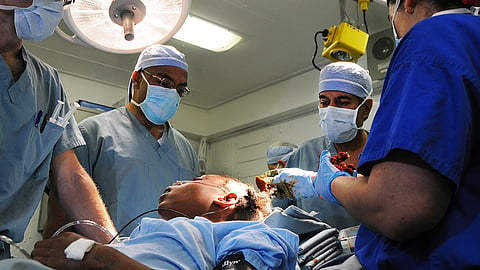

In a perplexing medical case from Chhattisgarh, a 40-year-old man suffered a brain hemorrhage after prolonged exposure to loud DJ music at an event in the Surguja division of Balrampur district. Sanjay Jaiswal, who had been helping load and unload equipment at the event, began feeling dizzy while the music blared. He soon left for home but later experienced vomiting and severe headaches.
Upon being taken to Ambikapur Government Medical College, a CT scan revealed that Jaiswal had suffered a brain hemorrhage due to a ruptured blood vessel in his brain. The case left doctors puzzled, as Jaiswal had no known history of high blood pressure, other medical conditions, or any physical injuries that might explain the hemorrhage.
Dr. Shailendra Gupta, an associate professor in the hospital’s ENT department, commented on the unusual nature of the case. Typically, brain hemorrhages like this are seen in patients with high blood pressure, those who have experienced accidents, or individuals with other significant injuries. However, Jaiswal was in good health, physically fit, and had no prior history of such medical issues, making his condition unusual and concerning.
Initially, Jaiswal was hesitant to reveal the full details of his experience, possibly due to his connection with the DJ and the event. “He was reluctant to share the truth at first,” Dr. Gupta told the Times of India. “But after some insistence, he broke down and explained that he had been working at the event when he suddenly felt dizzy due to the loud music. His condition worsened later that night.”
The doctors suspect that the loud soundwaves from the DJ music may have triggered the brain hemorrhage. Dr. Gupta explained that not everyone has a strong occipital region at the back of their skull, and intense sound vibrations could potentially impact this area of the brain, leading to a rupture in the blood vessels.
While cases of sound-induced brain hemorrhages are extremely rare, this incident has highlighted the potential dangers of exposure to excessively loud noises, especially for individuals working in close proximity to high-decibel environments. Jaiswal’s sudden health crisis has raised concerns among medical professionals about the potential long-term effects of loud music on brain health, especially in environments like concerts, parties, or events with powerful sound systems.
Jaiswal’s case is a stark reminder of the importance of protecting oneself from prolonged exposure to high-decibel noise, as it can have unforeseen consequences on even the healthiest individuals. Medical experts are urging caution and recommending better protective measures, particularly for those regularly working in loud environments.
As Jaiswal continues to recover, his case serves as a warning for the potential dangers posed by excessive noise, and the need for greater awareness about sound-related health risks. It also underscores the importance of paying attention to early signs of discomfort, such as dizziness or headaches, after exposure to loud sounds, as these could be warning signs of more serious underlying issues.
(Input from various sources)
(Rehash/Ankur Deka/MSM)
